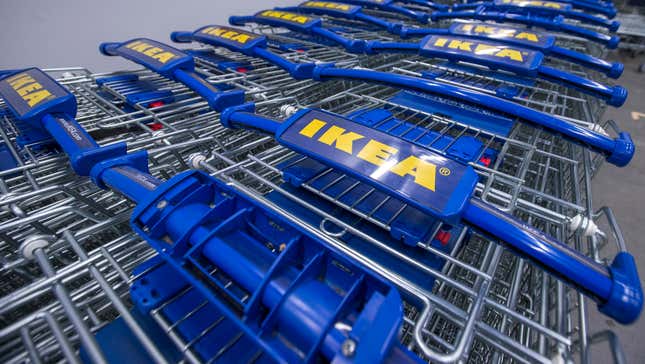
If you’re a retailer with a parking lot, offering electric vehicle charging stations can attract new customers and incentivize consumer spending. But there’s only one retailer with chargers at more than a third of its U.S. locations, according to a new study from Consumer Reports (CR).
The nonprofit surveyed over 270,000 stores operated by 75 of the largest national retailers in the U.S. across major retail categories, including grocery stores and discount stores. CR found that there’s essentially no type of retailer where drivers can “confidently” expect to charge their EVs.
Just one in every 14 big box stores and one in every 15 grocery stores surveyed has nearby EV chargers. The worst offenders are discount stores — namely Big Lots, Dollar General, Dollar Tree, Family Dollar, and Five Below. Out of their combined 37,825 locations, just two of them offer a collective five EV charging ports.
IKEA is one of the very few exceptions to retailers’ general snubbed nose toward EV infrastructure, according to CR. The Netherlands-based discount furniture seller is the only retailer that offers EV charging ports at almost all of its U.S. stores, of which IKEA has 54. No other big box retailer, even Target and Walmart, has chargers at more than 10% of their locations, although they have many more stores.
The chargers are part of the Swedish company’s aim to reach climate positivity by 2030. IKEA plans to ensure all customer deliveries and services it offers in 30 markets will use EVS or “other zero-emission solutions.”
“At IKEA, we believe that we must work together with our partners to tackle climate change and create solutions for a greener future,” IKEA U.S. CEO Javier Quiñones said in August 2022 after announcing a partnership with Electrify America. “We look forward to continuing to innovate around new ways we can make our everyday lives more sustainable.”
In the grocery sector, Amazon — which buys electric trucks from Rivian — and regional supermarkets like Big Y and Hy-Vee offer EV charging at over 10% of their locations; however, millennial-favorite Trader Joe’s and Aldi are lagging behind. Kohl’s is the only major department store invested in EV infrastructure.
Pennsylvania’s favorite — and divisive — sons, Wawa and Sheetz, are leading the convenience store segment in electrification, while Walgreens has pushed ahead of CVS in the drugstore segment. Less than 0.1% of all fast food restaurants had EV charging ports, although CKE Restaurants — the company behind Carl’s Jr. and Hardee’s— had a slightly better showing than industry giants like McDonald’s and Starbucks.
These companies — minus IKEA — are missing out on a big opportunity to attract more shoppers and elevate their brand while leveraging federal incentives to reduce the cost of these investments, according to CR. The Blink charging network says that 89% of EV drivers make a retail purchase while their car is getting juiced up.
Plus, just the very existence of a charger can generate significant gains for businesses. In September, researchers from Boston University and the University of Wisconsin-Madison found that locating a Tesla Supercharger near a retailer can increase monthly visits by 4% and grow revenue by 5%.
“Retailers are uniquely positioned to address America’s charging challenge because they have easily accessible, convenient locations in virtually every community,” Drew Toher, the sustainability campaign manager at Consumer Reports, said in a statement. “Installing EV chargers can help retailers meet a triple bottom line—helping people, the planet, and profits.”